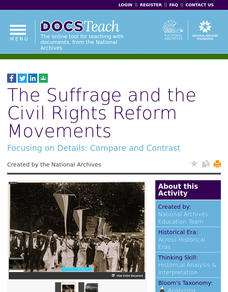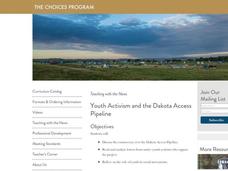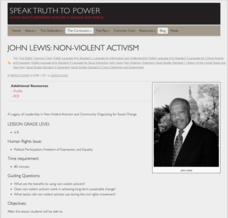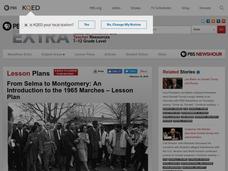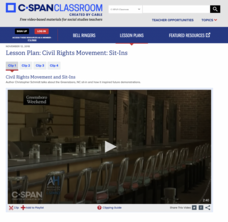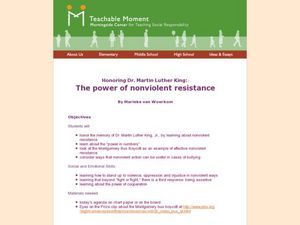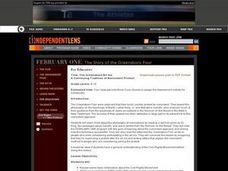DocsTeach
The Suffrage and the Civil Rights Reform Movements
It's the American way to put one foot in front of the other and march. Using images of protests from the civil rights and women's suffrage movements, young historians analyze similarities between the two watershed moments of social...
Curated OER
Gandhi Speech Writing
Explore non-violent protest in this social values and world history activity. After viewing the movie Gandhi, and discussing important events in Gandhi's life, young orators write a speech defending Gandhi's position on the value of...
Brown University
Youth Activism and the Dakota Access Pipeline
Do young people have a role in social movements? Should they? The involvement of young people in the Dakota Access Pipeline is the focus of a resource that asks class members to examine letters written by native youths who oppose the...
Speak Truth to Power
John Lewis: Non-Violent Activism
After comparing and contrasting non-violent and violent social movements, your young historians will take a closer look at the work and influence of John Lewis on the civil rights movement. They will then choose a current social justice...
PBS
From Selma to Montgomery: An Introduction to the 1965 Marches
The 1965 Civil Rights marches from Selma to Montgomery and the resulting Voting Rights Act of 1965 are the focus of a social studies lesson. The resource uses film clips to inform viewers not only about the discrimination that gave rise...
PBS
The Sixties: Dylan Plugs in and Sells Out
Before Woodstock, there was Newport. Get plugged in to the social changes of the 1960s with a lesson that looks at Bob Dylan's performance at the 1965 Newport Folk Festival as a symbol of the radical changes that marked the era.
C-SPAN
Civil Rights Movement: Sit-Ins
Part of the protests of the Civil Rights Movement were small scale sit-ins at lunch counters. This form of on-the-ground activism is the focus of a C-SPAN resource that includes four video-clips about the sit-ins by pupils at a lunch...
PBS
Organizing the Farm Worker Movement
The food on young scholars' tables was likely harvested by hands that fought for fair wages and working conditions. By examining the life of Cesar Chavez and Dolores Huerta, learners connect their daily meals with the struggles of those...
Stanford University
Kent State
Why did a peaceful student protest end in disaster? Young historians explain the impact of the Kent State shooting. Academics analyze a photo of the Kent State shooting and explain the significance of the event by completing short answer...
Center for Civic Education
The Power of Nonviolence: Music Can Change the World
Here is a fantastic activity through which class members discover how music has the ability to influence others in a meaningful way. After reviewing selected pieces and modern-day protest songs, learners will research other songs that...
Curated OER
25 Greatest Protest Songs
Students analyze the lyrics of protest songs as a catalyst for social change. They discuss the influence of music on behavior and explain the use of music as historical record.
Curated OER
The Power of Nonviolent Resistance
Students discuss the power of nonviolent resistance in terms of Dr. Martin Luther King and the boycotts that he led. In this nonviolent resistance lesson plan, students discuss their thoughts of nonviolent resistance and how they can use...
Curated OER
25 Greatest Protest Songs - Lesson 2
Students explain the potential consequences of protest. They discuss selected historical conflicts and examine the role of the individual in protest.
Curated OER
Social Activism In The United States
Students explore justice issues. In this social activism instructional activity, students watch "Social Activism in the United States," and then locate newspaper articles from the 1960's and 1970's about events during the era.
Curated OER
The Protestant Ethic and the Spirit of Capitalism
In this online interactive philosophy quiz worksheet, students respond to 20 multiple choice questions about Weber's The Protestant Ethic and the Spirit of Capitalism. Students may submit their answers to be scored.
Facing History and Ourselves
Violence and Backlash
Revolution and counterrevolution. Protest and counter-protest. Collaborators and bystanders. The focus of the fifth resource in the Reconstruction Era and Fragility of Democracy series is on the political violence that followed Radical...
DocsTeach
Suffragist Susan B. Anthony: Petitioning for the Right to Vote
What is the best way to get a point across: a petition or a protest? Using primary sources, including a petition from Susan B. Anthony and a photo of a White House protest from the early 1900s, young historians examine what women did to...
Curated OER
Evaluating Nonviolence as a Method of Social Change
During a lesson on Dr. Martin Luther King, Jr, the Civil Rights Movement, and/or nonviolent resistance, students can gather their thoughts in this activity. The questions cover Dr. King's philosophy of nonviolence, and two opinion...
Curated OER
Gandhi's Voice: Writing as Nonviolent Resistance
Ninth graders identify how Mahatma Gandhi used writing as a means of nonviolent communication. In this nonviolent resistance lesson, 9th graders watch a film about Gandhi as a writer and identify characteristics of nonviolent activism....
Curated OER
The Greensboro Sit-Ins: A Continuing Tradition of Nonviolent Protest
Students watch a video about nonviolent protests during the Civil Rights Movement. They discuss and write about the Greensboro sit-ins while deciding the effectiveness of this type of protest.
Curated OER
Leaders of the Protestant Reformation
Students examine role of Protestant Reformation in forming of numerous religions and religious ideas, identify key figures of Protestant Reformation, their religious ideas, and accomplishments, and discuss how religious ideas formed...
Curated OER
Nonviolent Resistance: Gandhi and King
Students use the internet to research the major events and dates of Mohandas Gandhi and Martin Luther King, Jr. In groups, they use this information to create a poster to present to the class. They reflect on how these two men were...
Curated OER
Speaking Out Against War
Students research on the Web and in other venues to track the Iraq war protests high school students have joined or even led. Students interview students in your community who have joined protests or expressed their views in other ways...
Houghton Mifflin Harcourt
Renaissance and Reformation Test Preparation
This multiple-choice assessment on the Renaissance and Reformation reviews topics from humanism and the protests of Martin Luther to Italian city-states. While this is a traditional assessment designed by a textbook publisher, you can...


